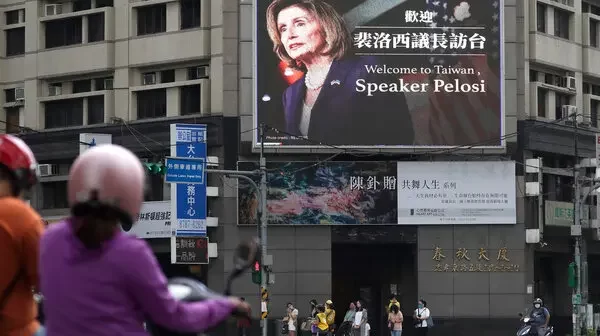
08.08.2022
Pelosi's Visit : A Costly Political Show
Ali Tuygan
Last Monday, National Security Council Spokesman John Kirby told reporters that nothing about House Speaker Nancy Pelosi’s possible trip changed US policy toward Taiwan. He said, “We have been clear from the very beginning that she will make her own decisions and that Congress is an independent branch of government. Our Constitution embeds a separation of powers. This is well known to the PRC, given our more than four decades of diplomatic relations. The Speaker has the right to visit Taiwan, and a Speaker of the House has visited Taiwan before without incident, as have many members of Congress, including this year.” He was referring to House Speaker Newt Gingrich’s visit to Taiwan in 1997.
John Kirby’s remarks on the separation of powers reminded me of Prime Minister Netanyahu’s visit to Washington in January 2015, only three months before the Israeli elections scheduled for March 17, 2015.
Mr. Netanyahu was invited to Washington by House Speaker John Boehner, a Republican. This was a breach of protocol since an invitation to a head of state or government can be extended by no other office than his or her counterpart, who is the head of state or government of that country. But House Speaker John Boehner, a Republican, simply wished to cause an embarrassment to President Obama, a Democrat. Both he and Mr. Netanyahu were wrong to organize the visit without seeking the approval of the White House. Moreover, the visit was in contradiction with the long-standing practice and principle by which the US president does not meet with heads of state or candidates soon before their elections. All in all, it was an embarrassment for Washington.
Separation is fundamental to democracy as we have bitterly come to learn in Türkiye. But no democratic system exists with an absolute separation of powers or an absolute lack of separation of powers. Governmental powers and responsibilities overlap; they are too complex and interrelated to be neatly compartmentalized. As a result, there is an inherent measure of competition and conflict among the branches of government. [i] This is particularly so between the executive and legislative branches but the independence of the judiciary remains sacrosanct.
In the case of House Speaker Pelosi’s visit to Taiwan, however, one cannot overlook the fact that both she and President Biden belong to the Democratic Party and one would only expect them to consult one another on matters of importance, overcome whatever differences they may have, and ensure a coherent US foreign policy.
Following the Pelosi visit, China’s Foreign Ministry Spokesperson Hua Chunying said, “To achieve China’s full reunification is the shared aspiration and sacred duty of all Chinese people. Public opinion will not be defied, and the trend of the times cannot be reversed.” She must have been referring to China’s evolution since the Gingrich visit in 1997. After Ms. Pelosi’s departure from Taipei, China launched its biggest military exercises in the Taiwan Strait. Taiwan called it “a blockade”, “a rehearsal for a real invasion”.
Beijing, following a G7 statement expressing concern over China’s response to the visit, canceled the planned talks between China’s Foreign Minister Wang Yi and his Japanese counterpart on the margins of the ASEAN meeting in Cambodia. Japan strongly protested against China after five ballistic missiles landed in Japan’s exclusive economic zone. And as could be expected, a day before the Pelosi visit, “Everything that relates to this tour, to the possible visit to Taiwan, is of course of provocative character,” the Kremlin spokesman, Dmitry Peskov told reporters adding that Russia is in absolute solidarity with China on the issue.
But there is more.
On June 17, 2022, US Senate Foreign Relations Committee Chairman Bob Menendez (D-N.J.) and Senator Lindsey Graham (R-S.C.) announced that they have introduced the bipartisan Taiwan Policy Act of 2022. The proposed legislation represents the most comprehensive restructuring of U.S. policy towards Taiwan since the Taiwan Relations Act of 1979. The Senate Foreign Relations Committee was originally scheduled to hear the proposed legislation last Wednesday but the meeting was temporarily delayed.
Specifically, the Taiwan Policy Act of 2022 seeks to create “a new initiative” to bolster Taiwan’s defense capabilities, providing 4.5 billion dollars in security assistance over the next four years. It proposes the designation of Taiwan as a Major Non-NATO Ally. And it proposes a US policy to promote Taiwan’s inclusion and participation in international organizations. Regarding this new initiative, the draft act says:
“The Secretary of State, in consultation with the Secretary of Defense, shall establish an initiative, to be known as the “Taiwan Security Assistance Initiative” that provides a Military Financing Program for Taiwan and other measures to strengthen the United States-Taiwan defense relationship, and to accelerate the modernization of Taiwan’s defense capabilities required to deter or, if necessary, to defeat an invasion of Taiwan by the People’s Republic of China.”
To propose such assured language in the Taiwan Policy Act of 2022, Chairman Menendez and Senator Graham should be certain that Russia would be defeated in its invasion of Ukraine.
At present Russia and the US have no political dialogue. What the Pelosi visit and the Chinese response may entail for China-US relations remains to be seen. Some press reports suggest that the White House is critical of the Taiwan Policy Act of 2022 and wants Democrats to vote against it. If these reports are accurate, where would House Speaker Pelosi stand?
What is amply clear is that the growing emphasis on military power does not bode well for global stability.
———————————————————————————————









